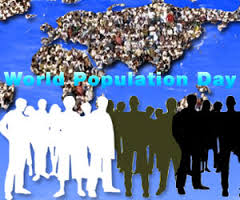World Population Day Essay
 World Population Day Essay
World Population Day EssayWorld Population Day is an annual event, observed on July 11, which seeks to raise awareness of global population issues.
In 1968, world leaders proclaimed that individuals have a basic human right to determine freely and responsibly the number and timing of their children. Forty years later, modern contraception remains out of reach for hundreds of millions of women, men and young people.
World Population Day 2008 reaffirmed the right of people to plan their families. It encouraged activities, events and information that will help make this right real - especially for those who often have the hardest time getting the information and services they need to plan their families, such as marginalized populations and young people.
UNFPA works with many partners, both within and outside the United Nations system, including Governments, non-governmental organizations, civil society, faith-based organizations, religious leaders and others, to achieve its mission. To better respond to local needs, UNFPA increasingly devotes resources to country-led efforts, placing emphasis on country-focused and country-led implementation to achieve improved results, at the same time addressing mutual accountability and strengthening harmonization and alignment.
The basic purpose behind the observance of this day is to increase awareness regarding the social and economic problems of over population. On this day various ceremonies and programs are being conducted all over the globe and specially in United States in which the people are convinced to keep their families short and to have proper gap in between their children so that economic burden from the family as well as from the state should be reduced.
World Population Day is not a public holiday as all the normal proceedings are carried but at the same time various NGO’s and different organizations do conduct the awareness programs regarding various issues which includes significance of family planning, gender equality, maternal health, poverty and human rights.
World Population Day is not a public holiday as all the normal proceedings are carried but at the same time various NGO’s and different organizations do conduct the awareness programs regarding various issues which includes significance of family planning, gender equality, maternal health, poverty and human rights.
Learn Astrology
Yog in Astrology
Marriage and Astrology
Career and Astrology
Lal Kitab
Articles
Vedic Rituals
Sikh Gurus
Interesting Stories
Vastu
Remedies
Chogadhia
Hora
Navratri
Dasmahavidya
Stories
Keep Smiling
Geeta Gyan
Temples in India
Temples in USA
Temples in UK
Temples in France
Essays
Recipes
Horoscope
Kavach
Topics
